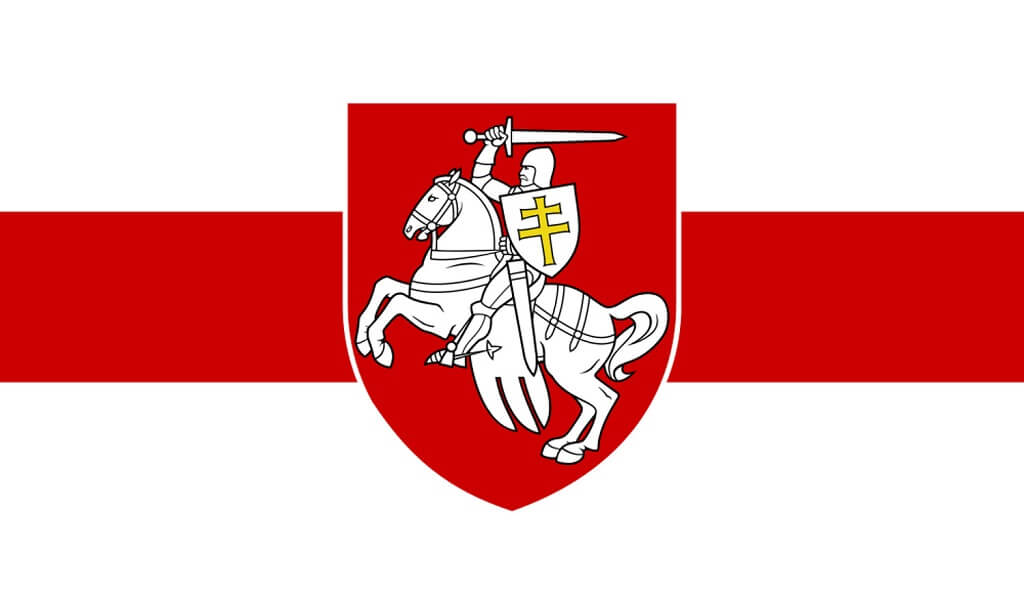Belarusians strive to rediscover their national identity
Sep 9, 2020 | Editorials, Featured
Canada should impose sanctions upon human rights abusers in Belarus
Marco Levytsky, Editorial Writer.
While the daily protests that have rocked Belarus since the fraudulent elections of August 9 began as a movement for democracy, they have evolved into a quest by Belarusians to rediscover their own roots and national identity.
Interestingly enough, Belarusian democracy activists hark back not to the first Belarusian states, the Kyivan Rus’ principalities of Polotsk and Turau, which gained a great degree of sovereignty during the disintegration of Rus’ following the death of Yaroslav the Wise, but to the Grand Duchy of Lithuania which incorporated these principalities in the 13th century. The coat of arms with the knight on horseback superimposed upon the red and white flag of independent Belarus from 1991 to 1995, is actually that of Grand Duke Gediminas of Lithuania. What’s more, the unofficial Belarusian opposition anthem “Pahonia”, refers to that coat of arms.
Gediminas also conquered most of the Ukrainian principalities of Kyivan Rus, the exception being Galicia which was taken by the Poles. But the Lithuanians’ smaller numbers in this medieval state gave the Ruthenians (present-day Belarusians and Ukrainians) an important role in the everyday cultural life of the state. In such circumstances, a vibrant Ruthenian culture flourished. Owing to the prevalence of East Slavs and the Eastern Orthodox faith among the population in eastern and southern regions of the state, the Ruthenian language (also known as Church Slavonic) was a widely used colloquial language. In fact, Old Belarusian, which evolved from medieval Ruthenian was the language of administration in the Grand Duchy of Lithuania until the late 17th century when it was eventually replaced by Polish.
As one Belarusian activist explained to us: “This period was a very progressive time in terms of the country’s governance with one of the first European constitutions, including such things as freedom of religion, etc. It is also about our national, cultural and spiritual heritage. A piece of history to base our national self-identification on. Our nation has been deprived of it for so many centuries in the past, and even now.”
Unlike Ukraine, which fell under Polish rule following the 1569 union of Lithuania and Poland, Belarus remained under Lithuanian administration until the late 18th century partitions of Poland when it fell under Russian rule. Brutal Russification began under the reign of Tsar Nicholas I who forbade the use of the term Belarus and renamed the region the “North-Western Territory”. He also prohibited the use of the Belarusian language in public schools and campaigned against Belarusian publications. Following an unsuccessful bid for independence in 1918, Belarus was divided between Poland and the USSR in 1921. The west was subjected to Polonization, while Russification was reintroduced in the east. This policy was extended to all of Belarus when the west was incorporated into the USSR after World War II. Belarusian national consciousness was revived briefly when the country became independent in 1991, but Alyaksandr Lukashenka reversed this process following his 1994 election and the imposition of a neo-Soviet dictatorship. Use of the Belarusian language was relegated to the countryside while the cities became almost totally Russified. As noted on the Belarus in Focus web site:
“The education system in the national language has not been allowed to develop, is deliberately not popularized and, by and large, has an image of low-quality secondary education in the public consciousness. Most of the Belarusian-language schools are located in rural areas. As a rule, such schools have a weak material base, and teaching is conducted according to outdated methods.”
Although the Belarusian activists in Canada communicate primarily in Russian, they are striving to learn their own language and sing Belarusian songs at their rallies. As one such activist put it: “It is a part of our self identification as a Belarusian nation.”
The Belarusian language is the language that is closest to Ukrainian. The Belarusian struggle to rediscover their national identity and language mirrors the same struggle that Ukrainians are engaged in following centuries of Russification. So is their desire to become a modern functioning European democracy. That is why these current protests are so important to Ukrainians in the geopolitical sense.
But, beyond geopolitics, these protests are also about basic human rights. The right for free and fair elections. The right for peaceful assembly. The right for freedom of expression and so on.
It is also about ousting a brutal dictator who fires upon peaceful protestors and subjects protestors to excruciating tortures. At September 4 webinar sponsored by the Canadian Institute of Ukrainian Studies, Bohdan Nahaylo, Lukashenka was described as a megalomaniac and probably a psychopath, who is even more brutal than Vladimir Putin. (More about the CIUS webinar in next week’s issue.)
If there was one resounding call coming from the most recent Belarusian rally in Edmonton, it was for Canada to impose sanctions upon Lukashenka and his cronies. The legislation for such sanctions is already in place. It’s called the Justice for Victims of Corrupt Foreign Officials Act (Sergei Magnitsky Law). It’s time to implement this legislation against the torturers of Belarus. As Edmonton Griesbach MP Kerry Diotte put it during that rally:
“It’s in Justin Trudeau’s hands. He could impose sanctions. Email Justin Trudeau. Every one of you. Every last one. Copy me. We are on your side. And force his hand. Tell Justin Trudeau to impose sanctions and that is the way that this will get resolved.”
We agree. Let your elected officials know that you agree as well.
Share on Social Media


































